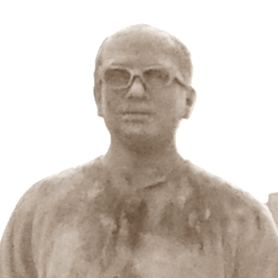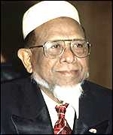Related Research Articles

Sheikh Mujibur Rahman, often shortened as Sheikh Mujib or Mujib, also widely known as Bangabandhu, was a Bangladeshi politician, statesman and the founding leader of the People's Republic of Bangladesh. He first served as the titular president of the Provisional Government of Bangladesh between April 1971 and January 1972. He then served as Prime Minister of Bangladesh from the Awami League between January 1972 and January 1975. He finally served as President again during BAKSAL from January 1975 till his assassination in August 1975. In 2011, the 15th constitutional amendment in Bangladesh referred to Sheikh Mujib as the Father of the Nation who declared independence; these references were enshrined in the fifth, sixth, and seventh schedules of the constitution.

Girma Wolde-Giorgis was an Ethiopian politician who was the president of Ethiopia from 2001 to 2013. He was the second person to hold the office of president since the founding of the Federal Democratic Republic of Ethiopia in 1995.

The Bangladesh Awami League, often simply called the Awami League or AL, is a centrist to centre-left political party in Bangladesh and one of the major political parties in Bangladesh, being the ruling party of Bangladesh since 2009.

The president of Somalia is the head of state of Somalia. The president is also commander-in-chief of the Somali Armed Forces. The president represents the Federal Republic of Somalia, and the unity of the Somali nation, as well as ensuring the implementation of the Constitution of Somalia and the organised and harmonious functioning of the organs of state. Currently, the president of Somalia is indirectly elected, chosen by the Federal Parliament of Somalia.

Nurul Amin was a prominent Pakistani leader, and a jurist who served as the eighth prime minister of Pakistan and as the first and only vice president of Pakistan. He is noted as being the last Bengali leader of Pakistan. His term of only 13 days as Prime Minister was the shortest served in Pakistani parliamentary history.

Syed Nazrul Islam was a Bangladeshi politician and a senior leader of the Awami League. During the Bangladesh Liberation War, he was declared as the Vice President of Bangladesh by the Provisional Government. He served as the Acting President in the absence of Sheikh Mujibur Rahman.

Tajuddin Ahmad was a Bangladeshi politician and statesman. He led the Provisional Government of Bangladesh as its prime minister during the Bangladesh Liberation War in 1971 and is regarded as one of the most instrumental figures in the birth of Bangladesh.

Abdus Samad Azad was a Bangladeshi diplomat and politician. He was elected to Bangladesh's parliament five times from 1970 to 2001. He was also elected Member of Lower Assembly in the Parliament of the then East Pakistan. He became President of the Muslim Student Federation of All - Asam in 1946 and led the Language Movement in 1952.

The Eritrean War of Independence was a war for independence which Eritrean independence fighters waged against successive Ethiopian governments from 1 September 1961 to 24 May 1991.
The Tigre people are an ethnic group indigenous to Eritrea. They mainly inhabit the lowlands and northern highlands of Eritrea.

Ibrahim Sultan Ali was born in Keren, Eritrea. He played a part in the emancipation of Tigre in Sahel and Barka and in establishing Blocco Independenza. He was also the Secretary General of the Eritrean Democratic Front (EDF).

The Ethiopian–Eritrean Federation was a coalition between the former Italian colony of Eritrea and the Ethiopian Empire. It was established as a result of the renunciation of Italy’s rights and titles to territorial possessions in Africa, inclusive of all its established territories or colonies made effective by the Treaty of Peace with Italy of 1947. The fate of Eritrea was contingent on numerous political, social, and economic ideals of Eritreans that ranged from leftists favoring independence, conservatives favoring Ethiopian crown rule, and Eritreans who favored a political union of the two sides of the spectrum. In an attempt to provide Eritrea with ultimate autonomy under an Eritrean curated constitution and governmental elections, UN Resolution 390 (A) was devised to implement such welfare to the individuals it was to be imposed upon.

Ataur Rahman Khan was a Bangladeshi lawyer, politician and writer, and served as Chief Minister of East Pakistan from 1 September 1956 – March 1958, and as the Prime Minister of Bangladesh from 30 March 1984 to 9 July 1986.
Sheikh Muhammad Tahir Rasheed, also known as Tahir Rashid, Urdu: شيخ محمد طاہر رشيد, was a Pakistani politician who was affiliated with the Pakistan Muslim League. He was previously Member of National Assembly of Pakistan (MNA) and Member of Provincial Assembly (MPA) (1990–1993). He was also the Central Vice-President of the Pakistan Muslim League.
The Moslem League of the Western Province was a political party in the Western Province, Eritrea. The party was founded by Sheikh Ali Radai, whose family originally migrated from the Hejaz region in Western Saudi Arabia and later became the President of the Eritrean Assembly. The party was formed after a split away from the Moslem League in 1949. The Moslem League of the Western Province was able to overtake half of the party membership of the pre-split Moslem League.

The Constitution of Eritrea is the supreme law of Eritrea. It provides the legal foundation for the existence of the State and source of legal authority. It sets out the rights and duties of its citizens, and defines the structure of government. Despite its ratification by the legislature, the constitution has yet to be implemented as of 2022.

Moinul Hoque Choudhury was an Indian politician from Assam. A five-time MLA; he was the Minister of Commerce and Industrial Development during Indira Gandhi regime in 1971. He is also known as the Industrial Reformer of the Barak Valley.
Hameed Hussain Sheikh Ismail, MBE was a Sri Lankan lawyer and politician. He was the 5th Speaker of the Parliament of Sri Lanka.

Hassan Ali Khaire, popularly known as Hassan Khaire, is a Somali activist and politician and is the former Prime Minister of Somalia. He was appointed on 23 February 2017 by Somalia President Mohamed Abdullahi Mohamed "Farmaajo" and resigned on Saturday July 25th 2020 after MPs passed a disputed vote of no confidence.
Ahmed Mohamed Jasir, is one of the most significant leaders in Eritrean history of struggle for independence from 1958 to 1990.
References
- ↑ Killion, Tom (1998). Historical dictionary of Eritrea. Lanham, Md.: Scarecrow Press. ISBN 978-0-8108-3437-8.
- 1 2 "Africa: Rivista trimestrale di studi e documentazione dell'Istituto italiano per l'Africa e l'Oriente".
{{cite journal}}: Cite journal requires|journal=(help)